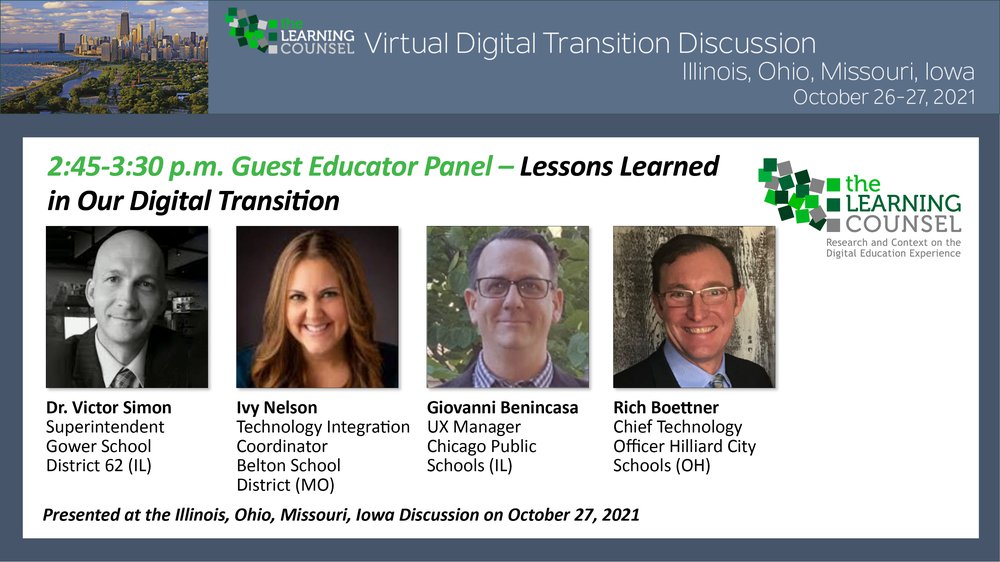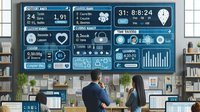Once again, it’s time for Lessons Learned in Our Digital Transition – Guest Educator Panel. Our Lessons Learned panel discussions tend to be no-holds-barred, with enough ideas, challenges and solutions to fill a dozen ordinary panel discussions. Or as they say in the South, it’s 20 pounds of solutions all shoved in a 10-pound sack. But any way you say it, the good ideas fly by, waiting for you to grab hold of them.
In today’s panel discussion, we feature Dr. Victor Simon, Superintendent at Gower School District 62, Ivy Nelson, Technology Integration Coordinator at Belton School District, Giovanni Benincasa, UX Manager from Chicago Public Schools and Rich Boettner, Chief Technology Officer at Hilliard City Schools.
According to Giovanni Benincasa, UX Manager from Chicago Public Schools, “On that human level, it's not the teacher's ability to use the computer to teach, it's the teacher's ability to have such an understanding of the computer to help the student learn. We gave teachers computers before we gave students computers so that they could get to that point. It keeps coming back to the human piece. You don't get there without that, you don't get there without accounting for that. One of the biggest mistakes that I made early in tech deployments was I had the right answer. So, I assumed that should just make all the doors and windows fly open. Cause we were right. No, you have to get people there. You know, and there are so many, it's not just teachers, now it's families. The thing that I think really rose to the forefront coming out of remote learning and the pandemic is the ability to support either the teacher or the student as a user of the technology. And the support has to come first. We don't think of that because we don't think of curriculum as a product. We don't think of learning as that type of service.”
Dr. Victor Simon, Superintendent at Gower School District 62 says, “I'm definitely a driver, but at the same rate, it hits me that way. So anyhow, progress over perfection, that's my first reaction to it. And secondly, we're Okay. It's like we have to be okay in our spaces as leaders to then have the courage to have these sort of findings that are out there. That's what I meant by culture, eating strategy for breakfast and a presentation. It's like, if we don't see where this feedback is or have opportunities for feedback to come in, I don't know that we'll even be able to think about those kinds of things from a superintendent perspective or a leadership perspective, because we're not encouraging those conversations to turn over that rock that that was talked about, an hour ago.”
According to Rich Boettner, Chief Technology Officer at Hilliard City Schools, “One of the things that teachers always struggle with is getting over the hurdles when it comes to using technology. There are so many times where they will hit a roadblock and if they don't have the support and they don't have the relationships with people within the building who will help them over those hurdles, they quickly will move on. There are too many variables; there are too many challenges dealing with the people that they work with, whether that be their kids or their parents or other staff, to deal with technology issues. So, um, relationships, again, coming back to that idea that those relationships are critical and if you don't have people who can help your staff move forward, success will not follow.”
Ivy Nelson, Technology Integration Coordinator at Belton School District said, “I'm in a doctoral program and I interviewed my superintendent and there was an interesting part of the interview where we were talking about looking at schools and education as a business model, which we don't oftentimes, and so thinking about who is the customer, right? And your primary customer is your students. We have to have students succeeding and then a lot of people look at parents and family as another stakeholder group, that's a big customer, but then also looking at your staff. So in a business model, are you completely concerned and solely concerned about your customer or do you also have to build up and do what is best for your employees as well? So that I think is what a lot of teachers are feeling.
“We have a huge teacher shortage and we have people leaving. I mean, I have never seen as many job postings this time of year as I have this year, not even last year. Um, but this year has been rough. So, I mean, just looking at it from that personnel side and, and a business minded side, businesses can't just think about their customers. They have to think about the people making their product as well.”
As you can see, our panel dove right in and put the issues on the table. The discussion is lively and varied, and agreement among the panelists was not a necessary component of the discussion. But solutions are. In this Lessons Learned episode, the challenges were nearly universal, and the answers were sensible and easy to adapt. Enjoy this discussion, but most of all, use it! You’ll find the lessons learned were often hard fought, yet they are freely given for your own use. Enjoy.










